Staffnet+ >
Rob Thomas and Tom Bowring on the road to 2030
Rob Thomas and Tom Bowring on the road to 2030 – “What kind of Vale of Glamorgan do we want?”
28 June 2024
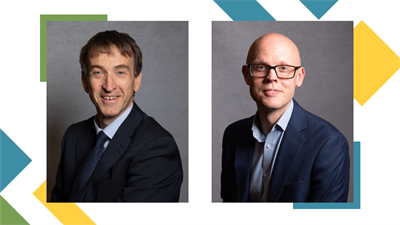 Chief Executive Rob Thomas and Director of Corporate Resources Tom Bowring discussed the Council’s plan for the future at a recent staff question and answer event.
Chief Executive Rob Thomas and Director of Corporate Resources Tom Bowring discussed the Council’s plan for the future at a recent staff question and answer event.
Held over Teams, the session was attended by more than 100 colleagues across all five Directorates keen to learn more about the new Corporate Plan and Reshaping Programme, which are both currently being developed.
The first of those items will set out the vision of how the organisation will look in 2030 and beyond, while the second describes the changes that must be made to get there.
Reshaping is not a new concept, it is a way of re-examining and reinventing services first adopted in 2015.
But with the massive financial challenges now facing the Council - caused largely by reduced funding and energy, inflation and interest rate spikes – there is a need to move more quickly and radically so transformation will be approached in a new way.
This will help make the necessary savings while allowing the Council to continue delivering for its communities.
“We need a new plan first and foremost because our current plan is coming to an end, but also because a lot’s happened recently,” said Rob.
“The make-up of our communities has changed over the last five years and the discrepancies between communities has changed and is increasing in some respects.
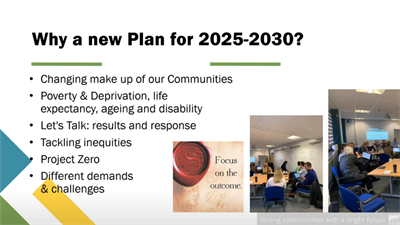
“There’s been a cost-of-living crisis and a lot of areas are experiencing poverty and depravation while life expectancy varies a lot depending on where you are born in the Vale. We’ve got an aging population and also issues around mental health and physical disability.
“It’s all very well to recognise that inequalities exist – we have to change that.
“We’ve also had the results to the Let’s Talk about Life in The Vale survey (which canvassed residents’ views on a wide range of subjects). It’s probably the biggest response we’ve had to a survey and it tells us we’ve got a lot to learn about how we interact with our communities and how we deliver services, and that there are a lot of improvements to make.
“The environmental agenda is well known. We have Project Zero, so how can we go about increasing the emphasis and impetus on Project Zero in terms of making a difference?
“We need to think about what kind of Vale of Glamorgan we want to have.”
The new Corporate Plan will be developed in line with the Future Generations and Wellbeing Act, Welsh Government legislation designed to improve people’s lives in the short, mid and long-term.
It will also closely link with the Council’s six Wellbeing Objectives.
These indicate that efforts should concentrate on: Creating a great place to live and work; Respecting and celebrating the environment; Giving everyone a good start in life; Supporting and protecting those who need us; Being the best Council we can be, and; Through it all, tackling poverty and inequalities.
The new Reshaping Programme has five broad themes, which overlap and interconnect.
These are:
- The Target Operating Model
- Service Transformation
- Strengthening Communities
- Digital Innovation
- Economic Resilience
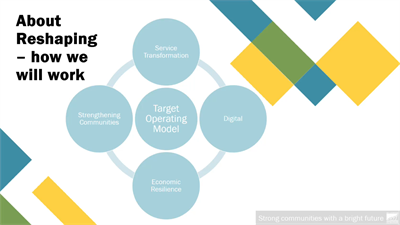
“There's lots of work happening in the background to flesh this out in more detail and there’ll be lots to share with you over the coming weeks and months,” said Tom.
“Back in 2015, we were very much talking about reshaping our services, but now it’s not just about our services but how we work with other people.
“That’s why this version of reshaping is unashamedly outward looking as well as being about how we will work as an organisation.
“It’s built around five key components, with the Target Operating Model at its heart.
“This is the glue that brings all of this together, holds us together as an organisation and allows us to deliver on the other elements of reshaping.”
The Target Operating Model is a way in which the Council wants to work to achieve optimum results.
It involves making the best use of assets, such as buildings, play areas and car parks; looking at innovative ways to generate income; empowering staff to deliver for residents and looking at new strategic ways of working both within existing teams and through greater collaboration.
Service transformation focuses on making services more responsive and cost effective while also delivering better outcomes. A good example of this the creation of the Big Fresh Catering Company, a Council operation that was set up as a separate entity, with profits invested back into the business.
Strengthening Communities describes a partnership approach in which the Council can work alongside the voluntary sector, third party organisations and town and community councils to make a real difference at a local level.
There is also a commitment to deliver the Digital Strategy, making the most of new technologies to ensure services and interactions with residents are delivered in the most efficient way possible.
The Council must also strive for Economic Resilience, working in regional partnerships and securing external funding to regenerate areas and create new places for people to live, work and enjoy.
These themes align with the Council’s aim to create Strong Communities with a Bright Future and its values to be: Ambitious, Open, Together, Proud.
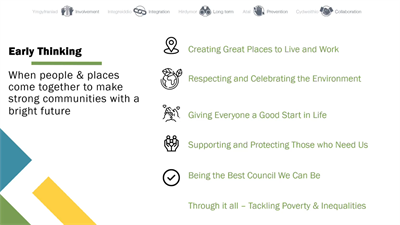
“Next, the Strategic Leadership Team (SLT) needs to finalise future projects and start looking for some quick wins, areas we can take forward at pace that can be used as examples of ideas that really work,” said Rob.
“We also need to get other projects up and running and focus on communication and engagement. That will continue over the summer with a series of Learning Café sessions.
“That’s important to get as many colleagues as possible aware and involved in this.
“I always tell people when I first meet them at the Welcome to the Vale sessions, I don’t have all the answers and neither does SLT. It’s the people that are working in the service areas that are aware of the challenges and opportunities that exist.”
Nine years ago, the Council’s first Reshaping Programme brought new service delivery models such as Shared Regulatory Services, the creation of a Neighbourhood Services approach, the establishment of five community-run libraries, remodelling of functions within Social Services and the creation of Big Fresh.
All of these were challenging at the time but have delivered smarter ways of working, financial savings, and more sustainable services.
More recently the Llantwit Major More Than Food Project, the Council’s reacquisition and operation of Penarth Pier Pavilion, and delivery of the Warm Welcome scheme have involved stepping outside traditional areas of work.
“It is very much going to be about outcomes, it’s about what we want the Vale to look like and feel like in five, 10, 15 years’ time, not a list of tasks to do,” added Rob.
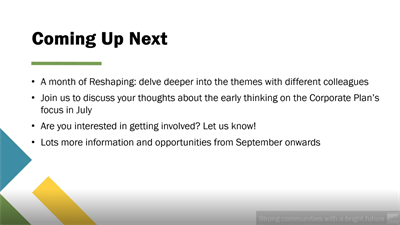
“We want to focus on the two things that make a community – the place and the people.
“If anyone is interested in getting involved in the workstreams or the sub-groups that will be created around them, then don’t sit back, let me know. We can make that happen.”
Over the coming weeks, different members of SLT will introduce each of the five reshaping themes to staff.
Everyone will then be asked for their input as the Corporate Plan develops further over the coming months.